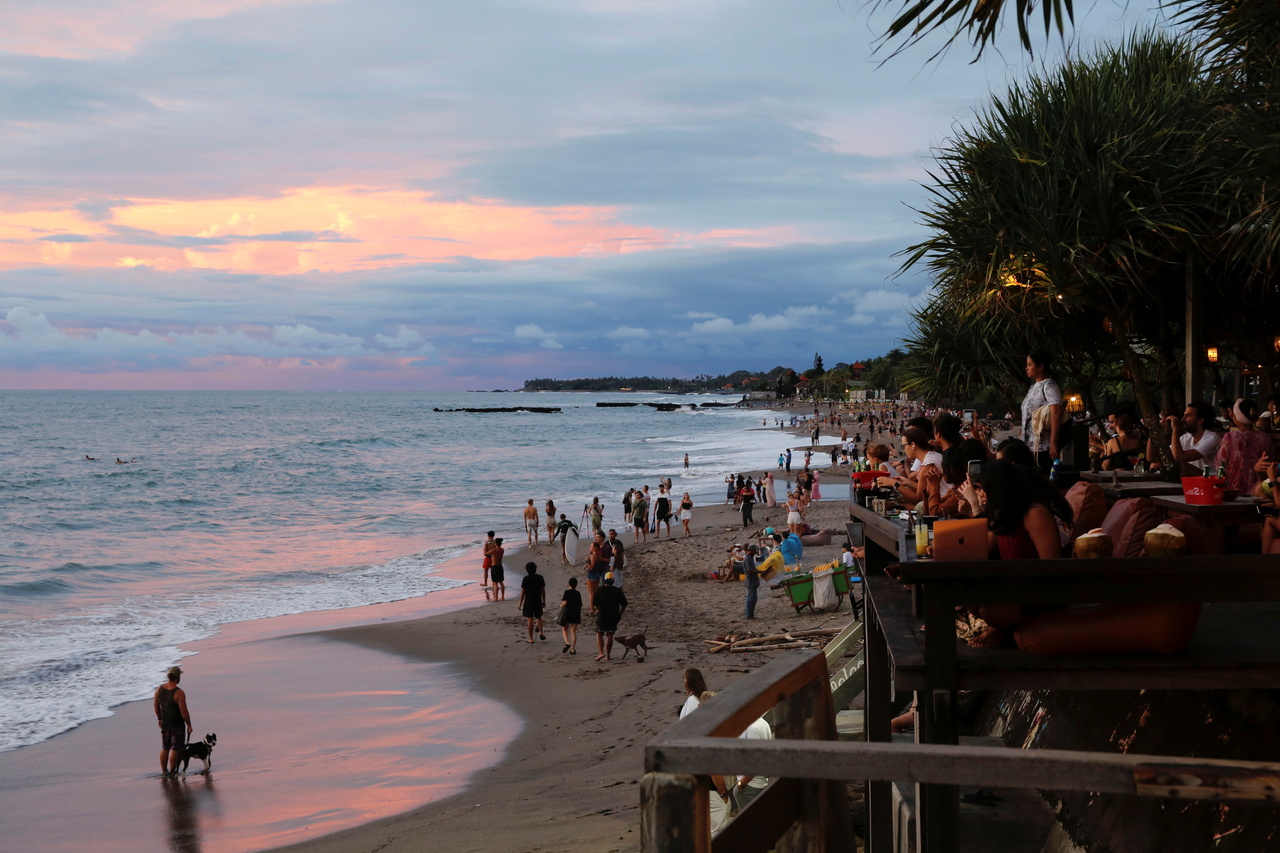No more quarantine for air travellers arriving in Indonesia as Covid-19 cases fall
Sign up now: Get insights on Asia's fast-moving developments

Tourists enjoying the sunset at Bali's Canggu beach on Dec 2, 2021. International air travellers to Indonesia will no longer need to serve quarantine.
PHOTO: REUTERS
Follow topic:
JAKARTA - International air travellers arriving in Indonesia no longer have to serve quarantine, as Covid-19 cases trend downwards around the vast archipelago.
"The Covid-19 situation has continued to improve, hence the government has decided to take several measures to ease restrictions," said President Joko Widodo in a speech on Wednesday (March 23).
But travellers will still need to do a polymerase chain reaction (PCR) test upon arrival in Indonesia, he added, without saying if pre-departure tests would continue to be a requirement.
Previously, travellers from overseas who were fully vaccinated or had a booster shot must serve a one-day quarantine, while those who were partially vaccinated served seven days of quarantine.
Wednesday's announcement came after a successful two-week trial of quarantine-free travel for visitors arriving on the main tourist islands of Bali, Batam and Bintan.
Currently, international arrivals by air are allowed only at the Soekarno-Hatta main international airport outside Jakarta and six other airports: Juanda in East Java; Ngurah Rai in Bali, Hang Nadim in Batam; Raja Haji Fisabilillah in Tanjung Pinang; Sam Ratulangi in Manado and Zainuddin Abdul Madjid in Central Lombok.
Other than the seven airports, overseas travellers may arrive in Indonesia by sea only via Bali, Batam, Tanjung Pinang, Nunukan in North Kalimantan, and by land via Entikong in West Kalimantan and Motaain in Nusa Tenggara Timur.
Other entry points have temporarily been closed because of the pandemic.
Mr Widodo did not say on Wednesday if the lifting of quarantine also applied to land and sea travellers.
In his speech, he also said that Indonesians who have had their booster shot can go on their annual Hari Raya home trips this year.
Despite a ban on such trips in the past two years, millions of people had travelled across the vast archipelago during the festive period, causing a surge in Covid-19 cases.
Breaking-of-fast gatherings and Hari Raya open house gatherings are banned for civil servants and high-ranking officials this year, Mr Widodo added. Last year, the ban was for everyone.
Indonesia's Covid-19 infection and death numbers have been on a decline in recent weeks. It has reported 5.98 million cases so far, with 6,376 new infections on Wednesday, down from 7,464 the day before.
The authorities said on Wednesday that there were 159 deaths in the past 24 hours - down from 170 on Tuesday - bringing the total death tally to 154,221.
At the peak of the Omicron wave in the third week of February, daily new cases were reported to be above 30,000 and daily deaths above 300.
Indonesia, which is South-east Asia's most populous country, has been praised for accelerating its vaccine roll-out despite the vast geographical challenge: The world's largest archipelagic nation has more than 17,000 islands.
It has fully vaccinated 75 per cent of its eligible population. Some 94 per cent of the people have received the first shot, as at March 22, placing Indonesia among the world's top five countries with the highest number of vaccinations.
Easing of travel curbs elsewhere
Thailand
From April 1, there will be no need for pre-departure polymerase chain reaction (PCR) tests.
The quarantine period for unvaccinated travellers will be cut from 10 to five days.
The Philippines
Previously, all tourists were banned. But since Feb 10, the country has opened to all fully vaccinated travellers from over 150 countries.
They do not have to be quarantined, but must present proof of vaccination and a negative test result upon arrival.
Unvaccinated or partially vaccinated travellers, and those without proof of vaccination, may also fly in, but have to be quarantined and tested on the fifth day.
Japan
Japan imposed an entry ban on foreigners - except those with residency status - between November and February to curb the spread of the Omicron variant.
Since March 1, it has allowed the entry of business travellers and students. Tourists remain banned.
Quarantine may last up to seven days, depending on where the travellers fly in from, their vaccination status and pre-departure PCR test result.
India
Last month, the mandatory seven-day home quarantine for international arrivals was changed to 14-day self-monitoring for symptoms.
Hong Kong
From April 1, the city will lift flight bans on nine countries including Australia, Canada, Britain and the United States. The mandatory hotel quarantine period will be reduced to seven days for fully vaccinated travellers.
Previously, they had to serve a 14-day hotel quarantine and self-monitor for a further seven days.

